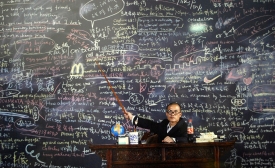economic development

This journal article by Zhao Kejin examines China's public diplomacy strategies, campaigns and global motivations to strengthen and secure its international public image.
On the eve of Prime Minister Narendra Modi’s visit to China, Xinhua published a rare opinion piece by his Pakistani counterpart Nawaz Sharif. The obvious choreography of the visit and article shows the delicate balance in relations between China, India and Pakistan. For Beijing, both powers are important if it is to realize its ambitious strategy of trade and economic corridors emanating from the Middle Kingdom under the rubric of the Silk Road Economic Belt.
China’s military is in the middle of a “hidden war” with the West, according to an editorial in the People’s Liberation Army Daily. The piece claims that the Internet has become an “ideological battlefield” that can only be won by controlling it. In shielding the Chinese public from “Western hostile forces,” China’s government may successfully win an ideological battle, but it may come at the cost of homegrown technological innovation and could stifle economic development.
The initiative announced on Tuesday will receive $300-million over the next five years. Proponents see the move as a good first step that could eventually put Canada in the ranks of other developed countries that are making a profit on loans and other financing options for Canadian, international and local businesses operating in developing countries.
Peng Liyuan, the celebrity wife of Chinese President Xi Jinping, has played a key role in successfully projecting the Communist giant's soft power abroad through her public diplomacy, according to a study on the country's first lady.
The Obama Administration has advertised that by using “smart power” it would enhance U.S. influence around the world. So it’s worth noting an episode in which China is routing the U.S. in economic diplomacy.
In a joint declaration issued by the two countries after the council's meeting, the prime ministers highlighted the role of mutual trust and friendly relations in economic development, peace, stability and prosperity in the region. Trade, energy and tourism were designated as strategic for both countries' interests.







